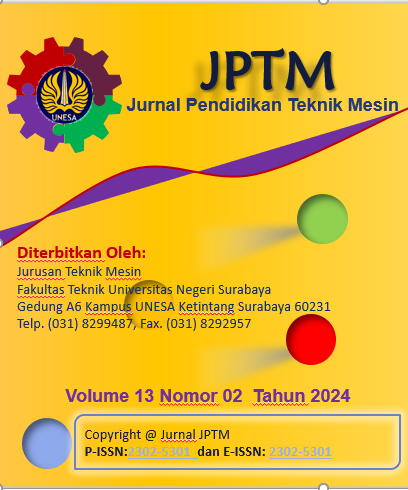ANALISA RESPON GURU DAN SISWA TERHADAP PENERAPAN SISTEM FULL DAY SCHOOL PADA PROGRAM KEAHLIAN TEKNIK KENDARAAN RINGAN DI SMKN 1 KEBONSARI MADIUN
DOI:
https://doi.org/10.26740/jptm.v13n02.p168-172Kata Kunci:
Full Day School, Analisis Deskriptif, Respon Siswa, Respon Guru.Abstrak
Abstrak
Tujuan penelitian ini dilakukan adalah untuk mengetahui respon guru dan siswa terhadap program full day school pada keahlian Teknik Kendaraan Ringan di SMKN 1 Kebonsari. Jenis penelitian yang digunakan adalah Deskriptif Kuantitatif yang mengacu pada teknik analisa data yang menggunakan analisis deskriptif.Penelitian ini mendapatkan kesimpulan adapun repon guru dari hasil analisis penyebaran angket mendapatkan hasil sebesar 77% masuk dalam katagori sangat setuju sedangkan hasil penyebaran angket kepada siswa mendapat hasil 75%, masuk dalam katagori setuju.Dari kedua hasil tersebut dapat di simpulkan bahwa program full day school pada program keahlian teknik kendaraan ringan di smkn 1 kebonsari medapat rspon yang baik dari guru maupun siswa.
Kata Kunci: Full Day School, Analisis Deskriptif, Respon Siswa, Respon Guru.
Unduhan
Referensi
1. Andesta Bujuri, Dian. 2018. Analisis Perkembangan Kognitif Anak Usia Dasar dan Implikasinya dalam Kegiatan Belajar Mengajar. Yogyakarta: Jurnal Tidak Diterbitkan, Vol. XI. No. 1.
2. Apriyani, A., Fatimah, N., & Wicaksono, H. 2018. Dari Full Day School ke Kebijakan enam hari Sekolah: Rasionalisasi Praktik dan Evaluasi Pembelajaran Pasca Full Day School di SMA Negeri 1 Kedungreja Kabupaten Cilacap. (online).
3. Erda, E. S., Suciati, S., & Iswahyudi, D. 2019. Implementasi Full Day School Pada Siswa Sekolah Menengah Atas Kelas X. (online).
4. Grahitno, Wicaksono Anggit. 2017. Fenomena Full Day School DDalam Sistem Pendidikan Indonesia. (online).
5. Hasanah, Uswatun. 2020. Peran Orangtua Dalam Meningkatkan Motivasi Belajar Agama Anak Di Dusun Penagan Jaya Desa Penagan Ratu Kabupaten Lampung Utara.(online) https://repository.metrouniv.ac.id.
6. Idrus, L. 2019. Evaluasi Dalam Prses Pembelajaran. Vol. 9, No. 2. (online) https://jurnal.iain-bone.ac.id.
7. Kusaeri. 2012. Pengukuran Dan Penilaian Pendidikan. Yogyakarta: Graha Ilmu.
8. Lutfiyak, Muh Fitrah. 2017. Metodologi Penelitian: Penelitian Kualitatif, Tindakan Kelas & Studi Kasus. Sukabumi: CV Jejak.
9. Pujihastuti, Isti. 2010. Prinsip Penulisan Kuesioner Penelitian. Vol. 2 No. 1. (online).
10. Rohana, Homsa Diyah. 2017. Pengaruh Sistem Full Day School Terhadap Pembentukan Karakter Religius Siswa Kelas V Di SD Nasima Semarang. (online). http://lib.unnes.ac.id /id/eprint/29555.
11. Sudjana, N. & Ibrahim. 2004. Penelitian dan Penilaian Pendidikan Cetakan Ketiga. Bandung: Sinar Baru Algesindo.
12. Sugiyono. 2012. Metode Penelitian Kuantitatif Kualitatif dan R&D. Bandung: Penerbit Alfabeta
13. UNESA. (2014). Pedoman Penulisan Skripsi Universitas Negeri Surabaya: Universitas Negeri Surabaya.
Diterbitkan
Terbitan
Bagian
 Abstract views: 24
Abstract views: 24





